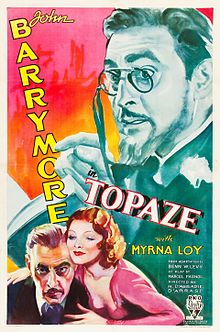
Grand Hotel is a 1932 American pre-Code drama film directed by Edmund Goulding and produced by Metro-Goldwyn-Mayer. The screenplay by William A. Drake is based on the 1930 play of the same title by Drake, who had adapted it from the 1929 novel Menschen im Hotel by Vicki Baum. To date, it is the only film to have won the Academy Award for Best Picture without being nominated in any other category.
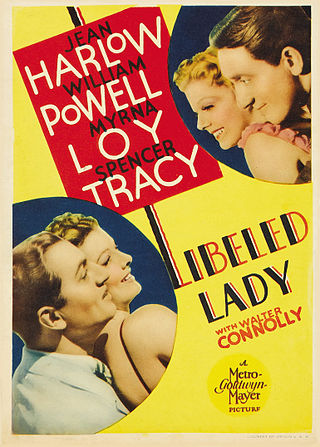
Libeled Lady is a 1936 American screwball comedy film directed by Jack Conway and starring Jean Harlow, William Powell, Myrna Loy and Spencer Tracy. It was written by George Oppenheimer, Howard Emmett Rogers, Wallace Sullivan, and Maurine Dallas Watkins. This was the fifth of fourteen films in which Powell and Loy were teamed, inspired by their success in the Thin Man series.

Test Pilot is a 1938 American drama film directed by Victor Fleming, starring Clark Gable, Myrna Loy and Spencer Tracy, and featuring Lionel Barrymore. The Oscar-nominated film tells the story of a daredevil test pilot (Gable), his wife (Loy), and his best friend (Tracy).

John Barrymore was an American actor on stage, screen and radio. A member of the Drew and Barrymore theatrical families, he initially tried to avoid the stage, and briefly attempted a career as an artist, but appeared on stage together with his father Maurice in 1900, and then his sister Ethel the following year. He began his career in 1903 and first gained attention as a stage actor in light comedy, then high drama, culminating in productions of Justice (1916), Richard III (1920) and Hamlet (1922); his portrayal of Hamlet led to him being called the "greatest living American tragedian".

Love Me Tonight is a 1932 American pre-Code musical comedy film produced and directed by Rouben Mamoulian, with music by Rodgers and Hart. It stars Maurice Chevalier as a tailor who poses as a nobleman and Jeanette MacDonald as a princess with whom he falls in love. It also stars Charles Ruggles as a penniless nobleman, along with Charles Butterworth and Myrna Loy as members of his family.

The Thin Man Goes Home is a 1944 American comedy mystery film directed by Richard Thorpe. It is the fifth of the six Thin Man films starring William Powell and Myrna Loy as Dashiell Hammett's dapper ex-private detective Nick Charles and his wife Nora. The supporting cast includes Lucile Watson, Gloria DeHaven and Helen Vinson. This entry in The Thin Man series was the first not directed by W.S. Van Dyke, who had died in 1943.
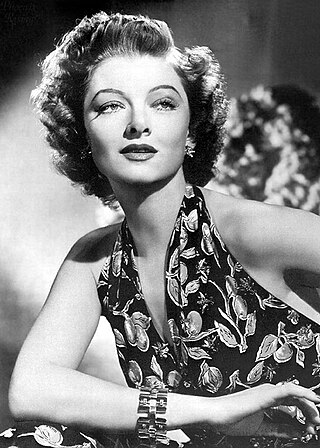
Myrna Loy was an American film, television and stage actress. As a performer, she was known for her ability to adapt to her screen partner's acting style.
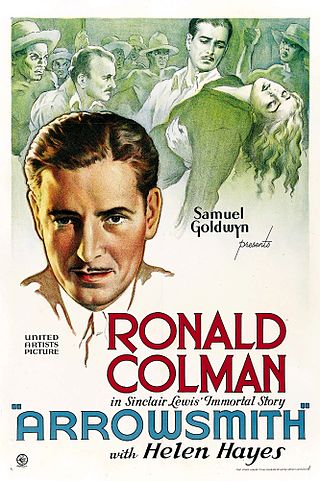
Arrowsmith is a 1931 American pre-Code drama film directed by John Ford and starring Ronald Colman, Helen Hayes, Richard Bennett, and Myrna Loy. It was adapted from Sinclair Lewis's 1925 novel Arrowsmith by Sidney Howard, departing substantially from the book regarding Arrowsmith's womanizing and other key plot elements. The pre-Code film received four Oscar nominations, including the Academy Award for Best Picture, Best Writing, Adaptation (Howard), Best Cinematography, and Best Art Direction.

Marcel Paul Pagnol was a French novelist, playwright, and filmmaker. Regarded as an auteur, in 1946, he became the first filmmaker elected to the Académie française. Although his work is less fashionable than it once was, Pagnol is still generally regarded as one of France's greatest 20th-century writers and is notable for the fact that he excelled in almost every medium—memoir, novel, drama and film.

Ever After is a 1998 American romantic period drama film inspired by the Charles Perrault fairy tale, "Cinderella". It is directed by Andy Tennant and stars Drew Barrymore, Anjelica Huston, Dougray Scott, Jeanne Moreau, Megan Dodds, Melanie Lynskey, Patrick Godfrey, Lee Ingleby, Richard O'Brien, Timothy West, and Judy Parfitt. Tennant, Susannah Grant and Rick Parks wrote the screenplay. George Fenton composed the original music score. The film's closing theme song, "Put Your Arms Around Me", is performed by the rock band Texas.
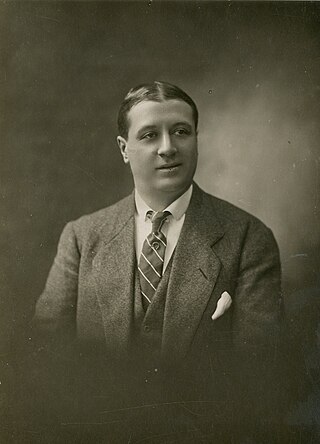
Jules Auguste Muraire, whose stage name was Raimu, was a French actor. He is most famous for playing César in the 'Marseilles trilogy'.
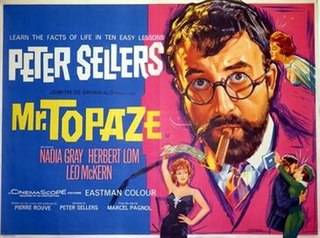
Mr. Topaze is Peter Sellers' directorial debut in 1961. Starring Sellers, Nadia Gray, Leo McKern, and Herbert Lom. His son Michael Sellers plays in the film in the role of Gaston. The film is based on the eponymous play by Marcel Pagnol.

Death Takes a Holiday is a 1934 American pre-Code romantic drama starring Fredric March, Evelyn Venable and Guy Standing. It is based on the 1924 Italian play La morte in vacanza by Alberto Casella (1891–1957), as adapted in English for Broadway in 1929 by Walter Ferris.

Body and Soul (1931) is an American Pre-Code action drama film directed by Alfred Santell and starring Charles Farrell, Elissa Landi, Humphrey Bogart, and Myrna Loy. The story, adapted from the stage play Squadrons by Elliott White Springs and A.E. Thomas, depicts Royal Air Force pilots in World War I.
Topaze is a 1928 play in four acts by the French writer Marcel Pagnol. It tells the story of a modest school teacher who is fired for being too honest and decides to become a dishonest businessman. The play premiered on 9 October 1928 at the Théâtre des Variétés. It was performed on Broadway in 1930 with Frank Morgan in the title role.

Parnell is a 1937 American biographical film produced by Metro-Goldwyn-Mayer, starring Clark Gable as Charles Stewart Parnell, the famous Irish politician. It was Gable's least successful film and is generally considered his worst, and it is listed in The Fifty Worst Films of All Time. The movie addresses the sex scandal that destroyed Parnell's political career, but its treatment of the subject is highly sanitized in keeping with Hollywood content restrictions at the time.

When a Man Loves is a 1927 American synchronized sound historical drama film directed by Alan Crosland and produced and distributed by Warner Bros. While the film has no audible dialog, it was released with a synchronized musical score with sound effects using the Vitaphone sound-on-disc process. The picture stars John Barrymore and features Dolores Costello in the frequently filmed story of Abbe Prevost's 1731 novel Manon Lescaut. The lovers suffer, but the film has an optimistic ending, as they head to America. Manon dies at the end of the novel. The UK release title was His Lady.
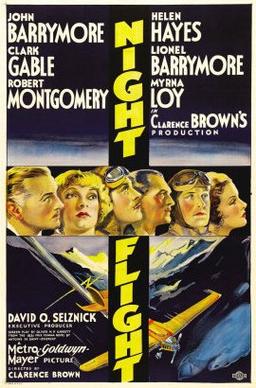
Night Flight is a 1933 American pre-Code aviation drama film produced by David O. Selznick, distributed by Metro-Goldwyn-Mayer, directed by Clarence Brown and starring John Barrymore, Lionel Barrymore, Clark Gable, Helen Hayes, Robert Montgomery and Myrna Loy.

Whipsaw is a 1935 American crime drama film directed by Sam Wood and starring Myrna Loy and Spencer Tracy. Written by Howard Emmett Rogers, based on a story by James Edward Grant, the film is about a government agent working undercover traveling across the country with an unsuspecting woman, hoping she will lead him to her gang of jewel thieves. The film was produced by Harry Rapf for Metro-Goldwyn-Mayer, and was released on December 18, 1935, in the United States.

So This Is Paris is a 1926 American silent comedy film produced and distributed by Warner Bros. and directed by Ernst Lubitsch. It is based on the 1872 stage play Le Reveillon by Henri Meilhac and Ludovic Halévy. It stars Monte Blue and Patsy Ruth Miller. The film is preserved in many archival holdings including the Library of Congress and the Turner Entertainment Company.
